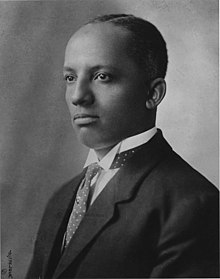
Back كارتر جي. ودسون Arabic كارتر جى. ودسون ARZ Carter G. Woodson German کارتر جی وودسون Persian Carter G. Woodson French Carter G. Woodson Dutch Carter G. Woodson Portuguese Carter G. Woodson SIMPLE Carter G. Woodson Tagalog
Carter G. Woodson | |
|---|---|
 | |
| Born | Carter Godwin Woodson December 19, 1875 New Canton, Virginia, U.S. |
| Died | April 3, 1950 (aged 74) Washington, D.C., U.S. |
| Education | Berea College (BLitt) University of Chicago (AB, AM) Harvard University (PhD) |
| Occupation(s) | Historian, author, journalist |
| Known for |
|
| Relatives | Bessie Woodson Yancey (sister) |
Carter Godwin Woodson (December 19, 1875 – April 3, 1950)[1] was an American historian, author, journalist, and the founder of the Association for the Study of African American Life and History (ASALH). He was one of the first scholars to study the history of the African diaspora, including African-American history. A founder of The Journal of Negro History in 1916, Woodson has been called the "father of black history."[2] In February 1926, he launched the celebration of "Negro History Week," the precursor of Black History Month.[3] Woodson was an important figure to the movement of Afrocentrism,[4] due to his perspective of placing people of African descent at the center of the study of history and the human experience.[5]
Born in Virginia, the son of former slaves, Woodson had to put off schooling while he worked in the coal mines of West Virginia. He graduated from Berea College, and became a teacher and school administrator. Earning graduate degrees at the University of Chicago, Woodson then became the second African American, after W. E. B. Du Bois, to obtain a PhD degree from Harvard University. Woodson is the only person whose parents were enslaved in the United States to obtain a PhD in history.[6] Largely excluded from the uniformly-white academic history profession, Woodson realized the need to make the structures which support scholarship in black history, and black historians. He taught at historically black colleges, Howard University and West Virginia State University, but spent most of his career in Washington, D.C., managing the ASALH, public speaking, writing, and publishing.
- ^ Du Bois, William Edward Burghardt (1997). The correspondence of W. E. B. Du Bois, Volume 3. University of Massachusetts Press. p. 282. ISBN 1-55849-105-8. Retrieved May 30, 2011.
- ^ Bennett, Lerone Jr. (2005). "Carter G. Woodson, Father of Black History". United States Department of State. Archived from the original on April 1, 2011. Retrieved May 30, 2011.
- ^ Daryl Michael Scott, "The History of Black History Month" Archived July 23, 2011, at the Wayback Machine, on ASALH website.
- ^ Early, Gerald (May 17, 2002). "Afrocentrism". Encyclopaedia Britannica. Retrieved July 24, 2022.
- ^ Wiggan, Greg (2016). Dreaming of a Place Called Home. Springer. p. 14. ISBN 978-9463004411.
- ^ "Carter G. Woodson: Winona, WV – New River Gorge National Park and Preserve (U.S. National Park Service)". www.nps.gov. Retrieved April 17, 2021.